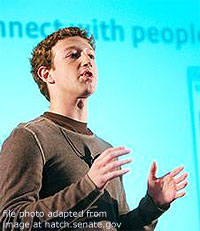Zuckerberg Visit Sparks Brain-Drain Debate in Russia

Bloomberg – bloomberg.com – Leonid Bershidsky – October 3, 2012 – Leonid Bershidsky, an editor and novelist, is Moscow and Kiev correspondent for World View.
For Prime Minister Dmitri Medvedev, Facebook CEO Mark Zuckerberg’s visit to Moscow was a great photo opportunity. Some of Russia’s technology entrepreneurs, though, saw it as the latest salvo in a global battle for the country’s best minds.
Ahead of the visit, Anatoly Karachinsky, one of Russia’s leading tech moguls, fired off an uncharacteristically outraged Facebook post in which he deliberately and repeatedly misspelled Zuckerberg’s name. “Recently, a number of Russian programmers — as far as I know, those who have rather unique and rare competencies and work for excellent Russian companies — have received invitations for interviews with Comrade Zuckerberger. Those who went say they have been offered jobs and immediate evacuation to America,” he wrote. The “meeting with the prime minister gives the process a kind of significance and legitimacy. I think the prime minister’s aides should work this through more thoroughly and think again whether we are sending the right signals to markets and to society.”
Karachinsky alluded to the sharp drop in Facebook’s share price — to about $22 from $38 — since the company’s initial public offering in May. “I understand his personnel problems: After the less than successful IPO, people who have lost money on their options are starting to look for work elsewhere. But that is no reason to equate us to Africa.”
The “Zuckerberger” diatribe was so untypical of the normally reserved Karachinsky — who heads IBS, a Frankfurt-quoted IT company with 2011 revenues of $816 million and a staff of about 8,000 — that it became an instant sensation on the Russian internet. Karachinsky is well known in the Kremlin: A company he controls, Medialogia, provides Russian officials with tools for analyzing aspects of public opinion, such as sentiment in blogs, social networks and media.
Zuckerberg’s visit to Russia, ostensibly to attend a developers’ conference and a contest called Facebook Hack, acquired an aura of scandal. A spokeswoman for Medvedev, Natalia Timakova, felt compelled to comment on Karachinsky’s post: “Anatoly, believe me, we have studied carefully why ‘the comrade’ is coming. Otherwise there would be no meeting.”
When the meeting did take place on Oct. 1, Medvedev appeared to have no idea what he wanted to talk about. “You probably know that Russia not only has gas, oil and diamonds cut and uncut, but that we also have an IT industry,” he said, according to the official transcript. Then he asked whether Zuckerberg thought he had helped change the world by creating its biggest social network. The Facebook CEO, who donned a suit and tie for the meeting, explained to Medvedev that he considered Russian developers quite good and had come to see them in action. He also gave Medvedev a Facebook T-shirt.
After the meeting — the official transcript ends with Medvedev offering his guest a cup of coffee — Medvedev posted pictures on Instagram and on Facebook. The only indication that something was achieved came from Russian Communications Minister Nikolai Nikiforov, who tweeted: “We agreed with Zuckerberg that it was more beneficial to open a Facebook R&D center in Russia.”
More beneficial, perhaps, than poaching Russian talent? That question went unanswered. Facebook was quick to deny that anything had been agreed on.
Zuckerberg, for his part, played the naïve and cheerful tourist, spending his entire two days in Moscow with a nerdy, angelic grin on his face. He went on a popular TV show where the host, Ivan Urgant, asked him whether he had met Pavel Durov, the founder of the Russian social network Vkontakte, best described as a Facebook clone. Zuckerberg said he had. “Well, why is he still alive?” Urgant quipped. Zuckerberg tipped back his head and roared with laughter.
Durov, meanwhile, corroborated Karachinsky’s story about Facebook hunting for employees of Russian tech companies, though he said no developers had deserted Vkontakte, which has several times as many users in Russia as Facebook. “No such fools here,” Durov said. “That’s a sinking ship.”
Zuckerberg’s ship didn’t appear to be sinking as he traipsed around Moscow dispensing sweatshirts and never losing that goofy grin. His lecture at Moscow State University was so heavily oversubscribed that the organizers had to hold a lottery with just 1200 lucky winners. The students could not get enough of Zuckerberg, who had to be led away firmly so he could make his plane.
During the visit, one interviewer put Karachinsky’s claim directly to Zuckerberg. The Facebook founder replied: “We are, of course, recruiting, but that’s not why I have come. I’ve come to support people, to talk about them building companies in Russia. That will help Facebook, but it seems to me that it will also help the developer community in Russia. It’s good for everybody.”
Even if some recruitment for Facebook’s Palo Alto office took place while Zuckerberg was in Russia, not everyone shared Karachinsky’s outrage about it. “You could put forward a legislative initiative forbidding Russian programmers to work for Western companies,” Svetlana Mironyuk, editor-in-chief of state-owned news agency RIA Novosti, suggested sarcastically in a comment to Karachinsky’s post. “That would be in the spirit of the times.”
In a separate comment, Internet entrepreneur Arthur Welf expressed a sentiment common among developers. “For a professional recruited by a global company there is no good reason to stay in Russia,” he wrote. “Russian authorities don’t give a damn about competitive conditions for business to keep it from fleeing the country, and they care even less about gifted engineers. It’s a big country, women will give birth to more.”
Article ©2012 BLOOMBERG L.P. ALL RIGHTS RESERVED; article also appeared at http://www.bloomberg.com/news/2012-10-03/zuckerberg-visit-sparks-brain-drain-debate-in-russia.html
